In today’s rapidly evolving marketing landscape, making informed decisions is more critical than ever. The sheer volume of data available can overwhelm even the most seasoned marketers. Companies are constantly striving to understand their customers better and optimize their marketing efforts. This is where marketing analysis tools come into play, transforming raw data into actionable insights that drive meaningful results. For instance, companies using advanced analytics have seen a 5-6% increase in ROI (Source: McKinsey, 2023). By leveraging these insights, businesses can enhance targeting, refine strategies, and ultimately boost their marketing ROI.
Many marketers struggle with data overload, leading to missed opportunities in targeting and engagement. Utilizing marketing analysis tools helps companies make sense of complex data, providing insights that drive effective strategies. Understanding your paid ads analytics can reveal which campaigns are delivering results. Selecting the right tool is crucial, as it can significantly influence the effectiveness of your marketing efforts. Let's dive into the top 9 marketing analysis tools that can help you navigate this data-driven landscape.
In an era where digital marketing reigns supreme, businesses face an overwhelming amount of data from various channels. From social media engagement to web traffic analytics, the rise of digital consumer interactions means that marketers must harness this data to stay competitive. For instance, a small local business tracking social media engagement to refine its advertising strategy improved their click-through rates by 30% (Source: HubSpot, 2023). Understanding and leveraging data is crucial for making informed marketing decisions.
Marketing analysis tools convert raw data into actionable insights, enabling businesses to make smarter decisions. These tools enhance targeting, improve ROI, and provide deeper insights into customer behaviors. A marketing team that utilizes demographic insights from their analytics platform to tailor a campaign could see a 25% increase in conversions (Source: Salesforce, 2023). By utilizing these tools, marketers can create more effective strategies that resonate with their audience.
Best for: Real-time marketing analytics and multi-touch attribution.
Cometly is an advanced marketing attribution software that focuses on real-time optimization and provides insights into the customer journey across multiple touchpoints.
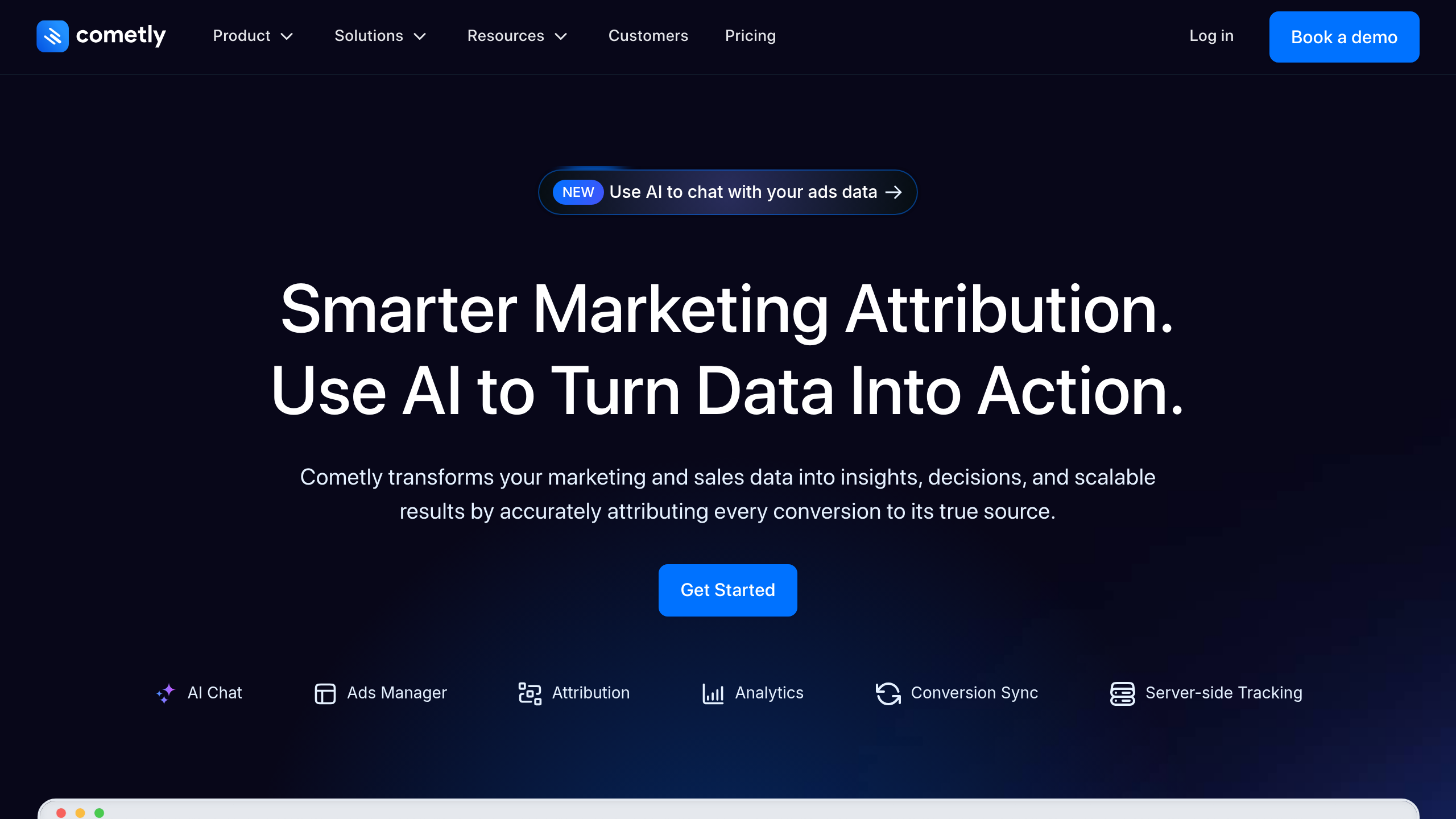
Cometly excels in marketing attribution, empowering marketers to understand the effectiveness of their campaigns. With a focus on multi-touch attribution, Cometly allows businesses to track customer interactions at every stage of the buyer's journey. For example, a SaaS company increased its ad performance by 35% using Cometly to gain deeper insights into customer behavior.
1. Real-Time Optimization: Cometly provides real-time insights, allowing marketers to adjust their strategies on the fly.
2. Multi-Touch Attribution: The platform tracks multiple customer touchpoints, giving a comprehensive view of campaign effectiveness.
3. User-Friendly Interface: The intuitive design makes it accessible for marketers without extensive technical knowledge.
4. Confidence in Data Accuracy: Cometly ensures high data fidelity, enabling marketers to make reliable decisions.
5. Seamless Integration: The platform integrates easily with existing marketing tools, streamlining workflows.
A retail business optimized its ad spend by 25% using insights from Cometly, showcasing its potential to enhance marketing effectiveness.
Pros: Ease of use and insightful reports. Cons: There may be a learning curve for advanced features.
Cometly's ability to provide real-time insights into multi-touch attribution makes it invaluable for marketers aiming to improve their campaign effectiveness. By understanding the customer journey across various channels, businesses can allocate their marketing budgets more efficiently and ultimately achieve higher ROI.
Best for: Essential web traffic insights and foundational analytics.
Google Analytics is a free tool widely adopted for analyzing web traffic and user behavior on websites.
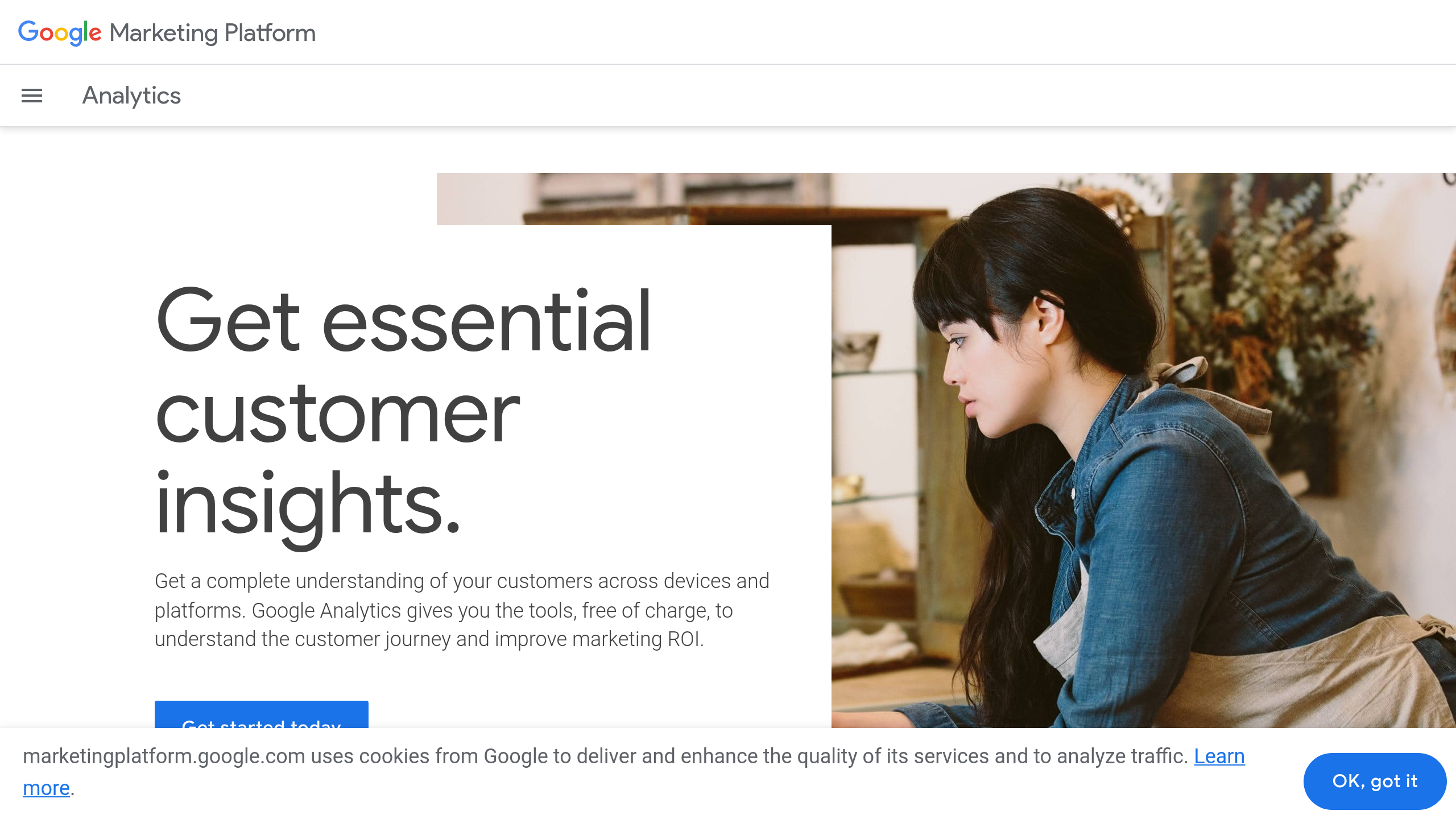
Google Analytics serves over 30 million websites, making it the go-to tool for businesses looking to understand their online presence. With its comprehensive analytics capabilities, users can track everything from page views to user demographics, making it an essential tool for digital marketing strategies.
1. In-Depth Traffic Analysis: Google Analytics provides detailed insights into user behavior, allowing businesses to track how visitors interact with their content.
2. Audience Insights: The tool offers demographic and geographic data, helping marketers tailor their strategies to specific audiences.
3. Conversion Tracking: Users can set up goals to track conversions, providing clarity on the effectiveness of marketing efforts.
4. Extensive Reporting: Google Analytics generates comprehensive reports that can be customized to suit various analysis needs.
5. Integration Capability: The tool can be easily integrated with other Google services, enhancing its functionality.
A small business used Google Analytics to track user behavior, leading to improved site navigation and a 20% increase in sales, demonstrating its foundational role in analytics.
Pros: Free to use and has an extensive community for support. Cons: Can be complex for beginners without prior analytics experience.
Google Analytics is an essential tool for marketers, providing insights that help drive effective marketing strategies. Its ability to track user behavior and conversions allows businesses to make informed decisions that enhance their overall marketing efforts.
Best for: Comprehensive SEO and marketing insights.
SEMrush is a powerful tool for SEO and marketing analysis, designed to help businesses track their performance and improve their visibility online.
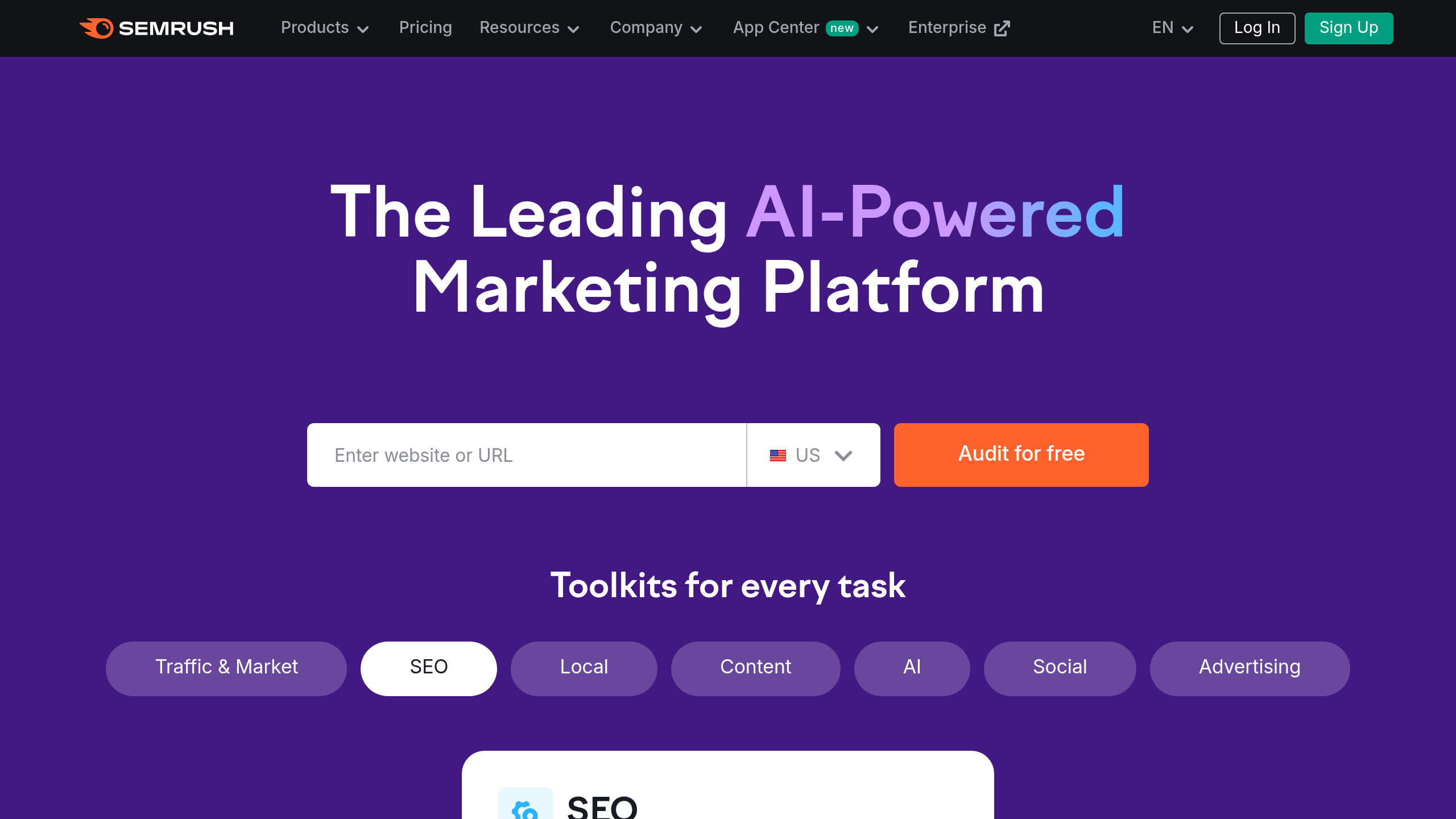
SEMrush is a powerhouse for SEO and marketing insights, boasting over 7 million users worldwide. It provides businesses with the tools necessary to track their online performance and optimize their marketing strategies effectively.
1. Keyword Tracking: SEMrush offers robust keyword tracking capabilities, allowing marketers to monitor their rankings and discover new opportunities.
2. Competitor Analysis: Users can analyze competitor performance, gaining insights that can inform their own strategies.
3. Site Audits: The tool performs comprehensive audits to identify areas for improvement in SEO practices.
4. Performance Tracking: SEMrush allows marketers to track their performance over time, helping them make data-driven decisions.
5. Content Optimization: The platform provides recommendations for optimizing content, enhancing search visibility.
A digital marketing agency used SEMrush to refine its SEO strategy, leading to a 40% increase in organic search rankings, showcasing its importance in driving traffic.
Pros: Provides comprehensive insights into various marketing metrics. Cons: Pricing may be a barrier for startups and small businesses.
SEMrush is vital for marketers seeking to improve their SEO efforts and overall online visibility. With its extensive features and tools, it empowers users to optimize their marketing strategies and achieve better results.
Best for: Data visualization and reporting.
Tableau is a leading data visualization tool that helps businesses transform data into interactive, visual insights.
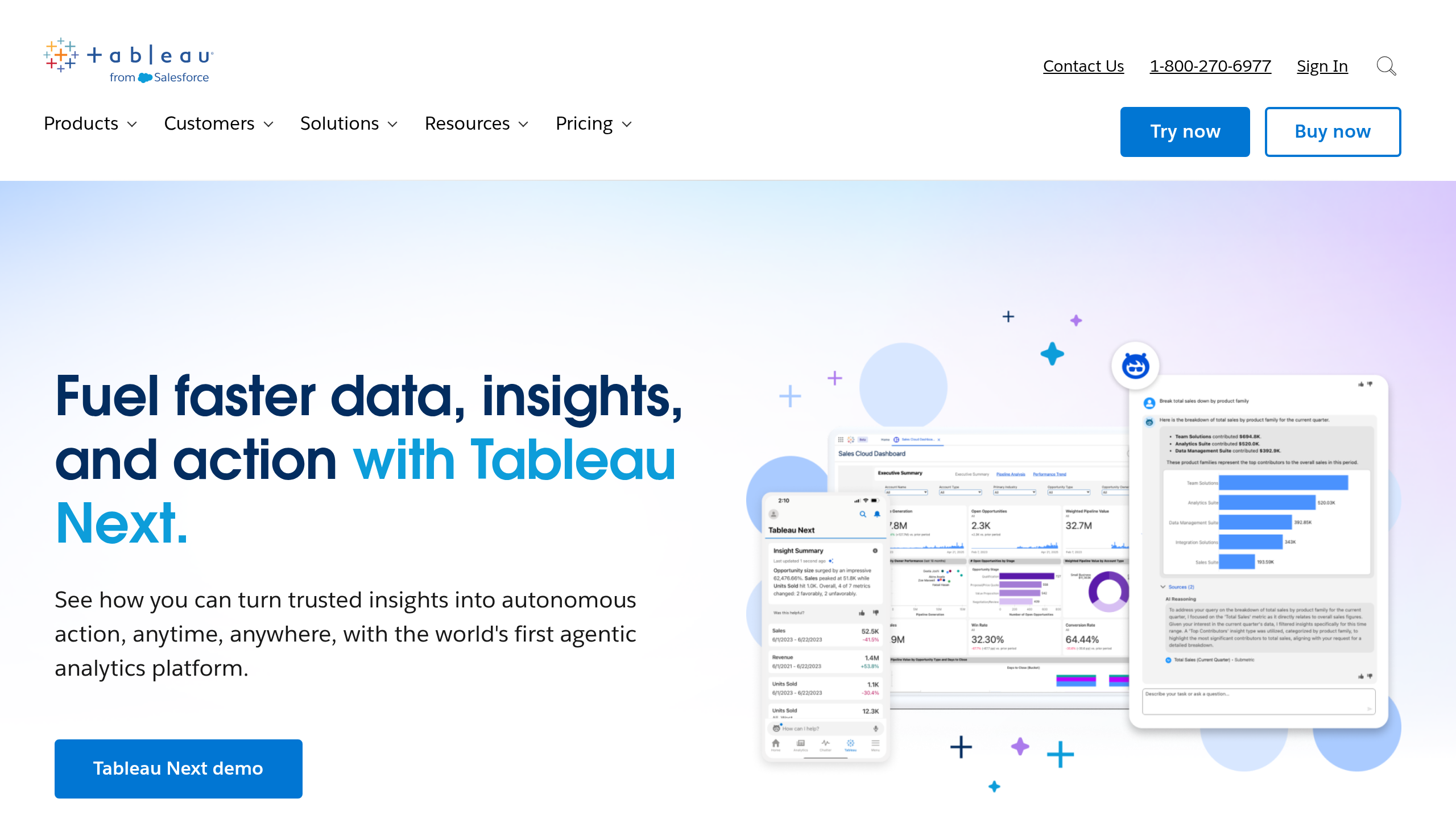
Tableau excels in data visualization, enabling businesses to create interactive dashboards that make complex data easy to understand. Its powerful analysis capabilities allow marketers to glean insights from large datasets quickly.
1. Interactive Dashboards: Tableau allows users to create dynamic dashboards that provide real-time insights.
2. Extensive Data Integration: The platform can connect with various data sources, enhancing its versatility.
3. User-Friendly Interface: Its intuitive design makes it accessible, even for those without a technical background.
4. Collaborative Features: Users can share insights easily across teams, fostering collaboration.
5. Advanced Analytics: Tableau provides advanced analytics capabilities, helping marketers uncover deeper insights.
A marketing team used Tableau to visualize their campaign performance, leading to a 30% improvement in reporting efficiency.
Pros: Highly customizable visualizations and strong integration capabilities. Cons: Can be expensive for small teams and requires training to master.
Tableau is essential for marketers looking to make data-driven decisions through effective visualization. Its capabilities allow teams to present complex data in a way that is easily digestible, leading to better insights and strategic actions.
Best for: Comprehensive marketing analytics across channels.
Adobe Analytics offers in-depth analytics solutions tailored for enterprises wanting to measure digital performance.
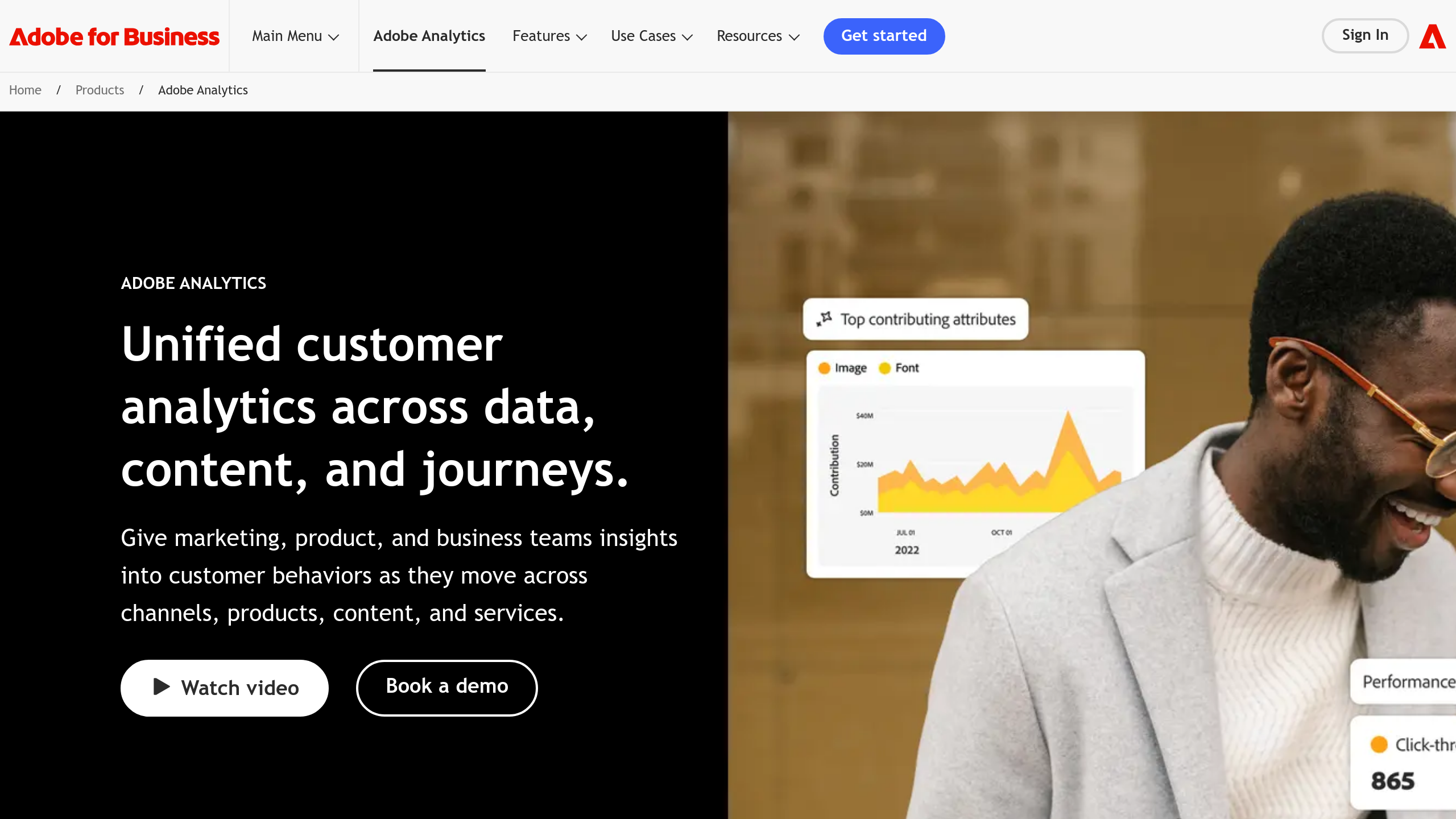
Adobe Analytics provides advanced analytics capabilities that help businesses track customer interactions across various digital touchpoints. Its sophisticated tools allow for detailed segmentation and predictive analytics, making it ideal for larger organizations.
1. Real-Time Data: Adobe Analytics delivers real-time insights, allowing marketers to react quickly to user behavior.
2. Predictive Analytics: The platform offers predictive analytics to forecast trends and customer actions.
3. Data Visualization: Users can create customizable reports and dashboards for comprehensive data presentation.
4. Audience Segmentation: The tool allows marketers to segment audiences based on behavior and demographics.
5. Cross-Channel Measurement: Adobe Analytics enables tracking across various marketing channels, providing a holistic view of performance.
A large retail corporation improved its customer engagement metrics by 40% through insights gained from Adobe Analytics.
Pros: Robust analytics capabilities and excellent data visualization options. Cons: High cost and complexity might deter smaller businesses.
Adobe Analytics is perfect for enterprises looking for a comprehensive analytics solution. Its advanced features empower marketers to gain detailed insights and optimize their strategies across multiple channels.
Best for: Inbound marketing and analytics.
HubSpot is an all-in-one platform for marketing, sales, and customer service, providing comprehensive analytics tools.
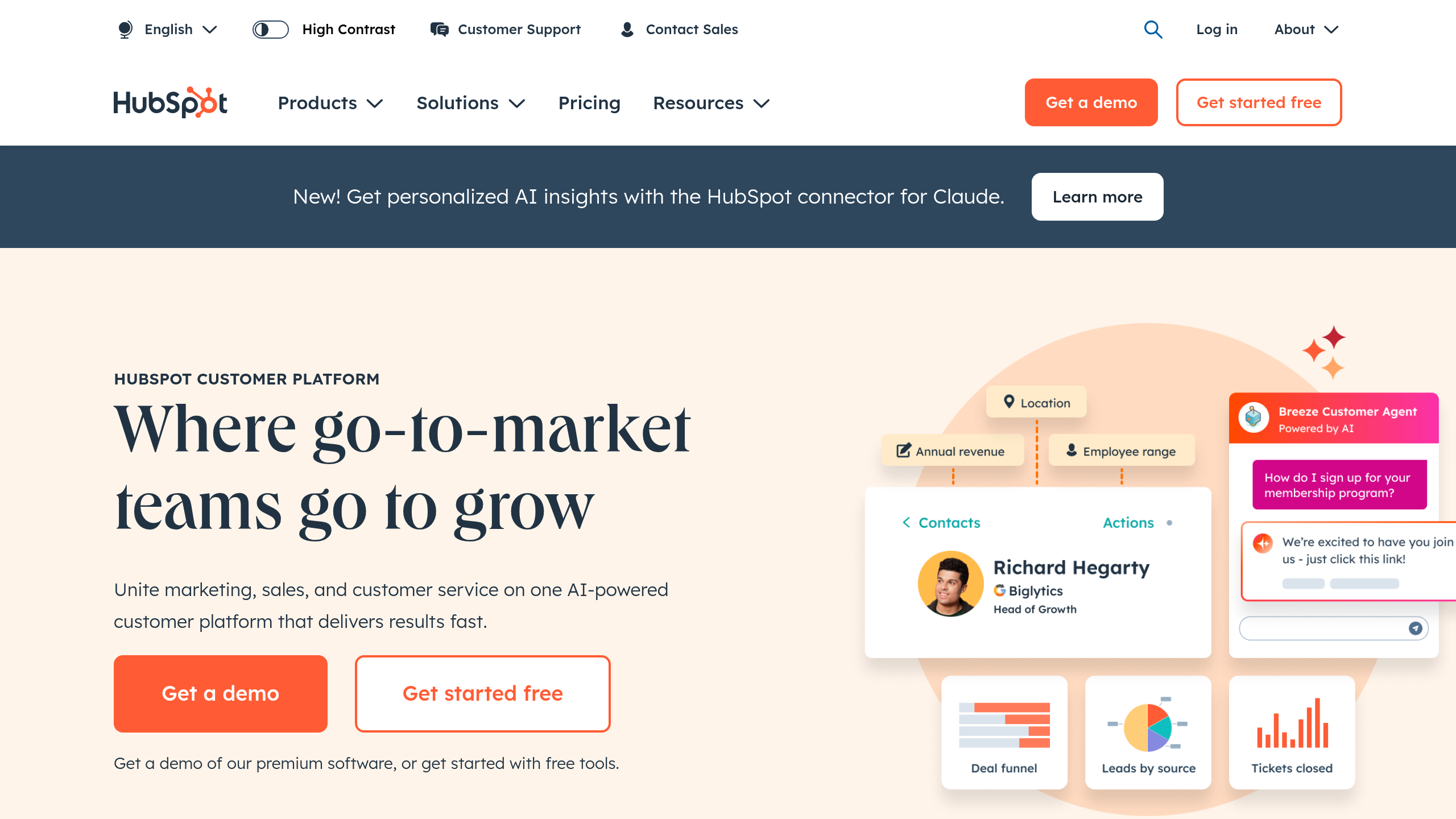
HubSpot combines marketing automation with comprehensive analytics, making it an essential tool for inbound marketing strategies. It allows users to track the performance of their marketing campaigns effectively.
1. Marketing Automation: HubSpot automates marketing tasks, enhancing efficiency and effectiveness.
2. Performance Analytics: Users can track the success of their marketing efforts through detailed analytics dashboards.
3. Lead Management: HubSpot provides tools for tracking and managing leads effectively.
4. Content Management: The platform integrates content creation and analytics, making it simpler to track performance.
5. CRM Integration: HubSpot's CRM allows seamless data flow between marketing and sales teams.
A company using HubSpot increased lead generation by 50% within three months by leveraging its analytics capabilities.
Pros: Comprehensive features and user-friendly interface. Cons: Higher pricing tiers for advanced features.
HubSpot's all-in-one capabilities make it a favorite among marketers looking to streamline their processes. Its focus on inbound marketing helps businesses attract, engage, and delight customers effectively.
Best for: Product analytics and user behavior tracking.
Mixpanel specializes in product analytics, helping businesses track user interactions with their products.
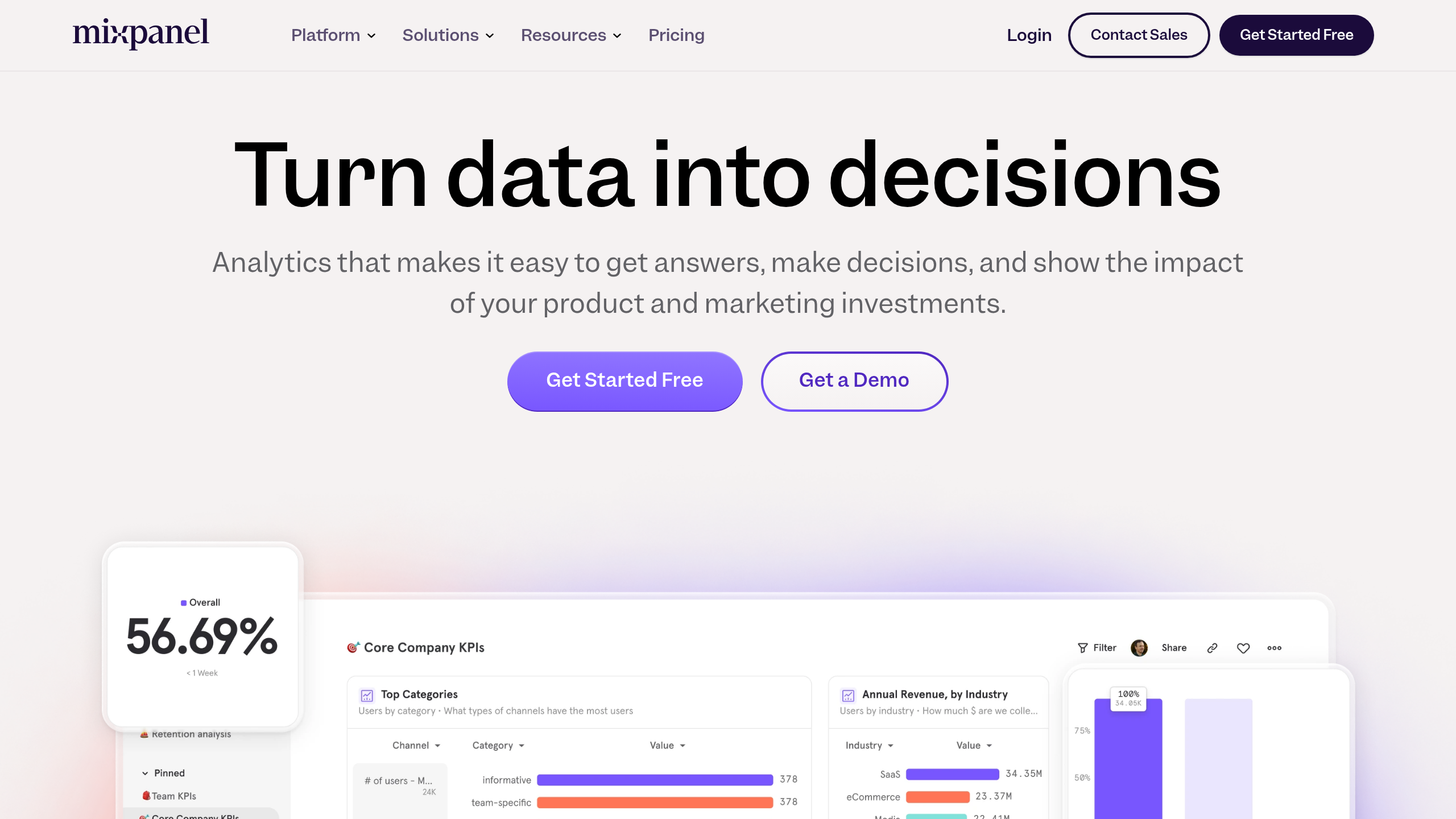
Mixpanel allows businesses to analyze user behavior in real-time, providing insights that can drive product development and marketing strategies. Its analytics capabilities focus on understanding how users engage with products.
1. Event Tracking: Mixpanel tracks specific user actions, giving insights into engagement levels.
2. Funnel Analysis: Users can visualize conversion funnels to identify drop-off points.
3. A/B Testing: The platform supports A/B testing to optimize product features and marketing strategies.
4. Cohort Analysis: Mixpanel enables businesses to segment users based on behaviors, enhancing targeted marketing efforts.
5. Real-Time Data: Users gain access to real-time analytics, facilitating immediate decision-making.
A SaaS company utilized Mixpanel to improve user engagement, resulting in a 30% boost in product usage.
Pros: In-depth product analytics capabilities. Cons: Learning curve for new users.
Mixpanel is indispensable for product-focused marketers, providing the insights necessary to enhance user experience and drive engagement. Its focus on user behavior is crucial for refining marketing strategies.
Best for: Customer behavior tracking and analytics.
Kissmetrics specializes in customer analytics, providing businesses with insights into user behavior over time.
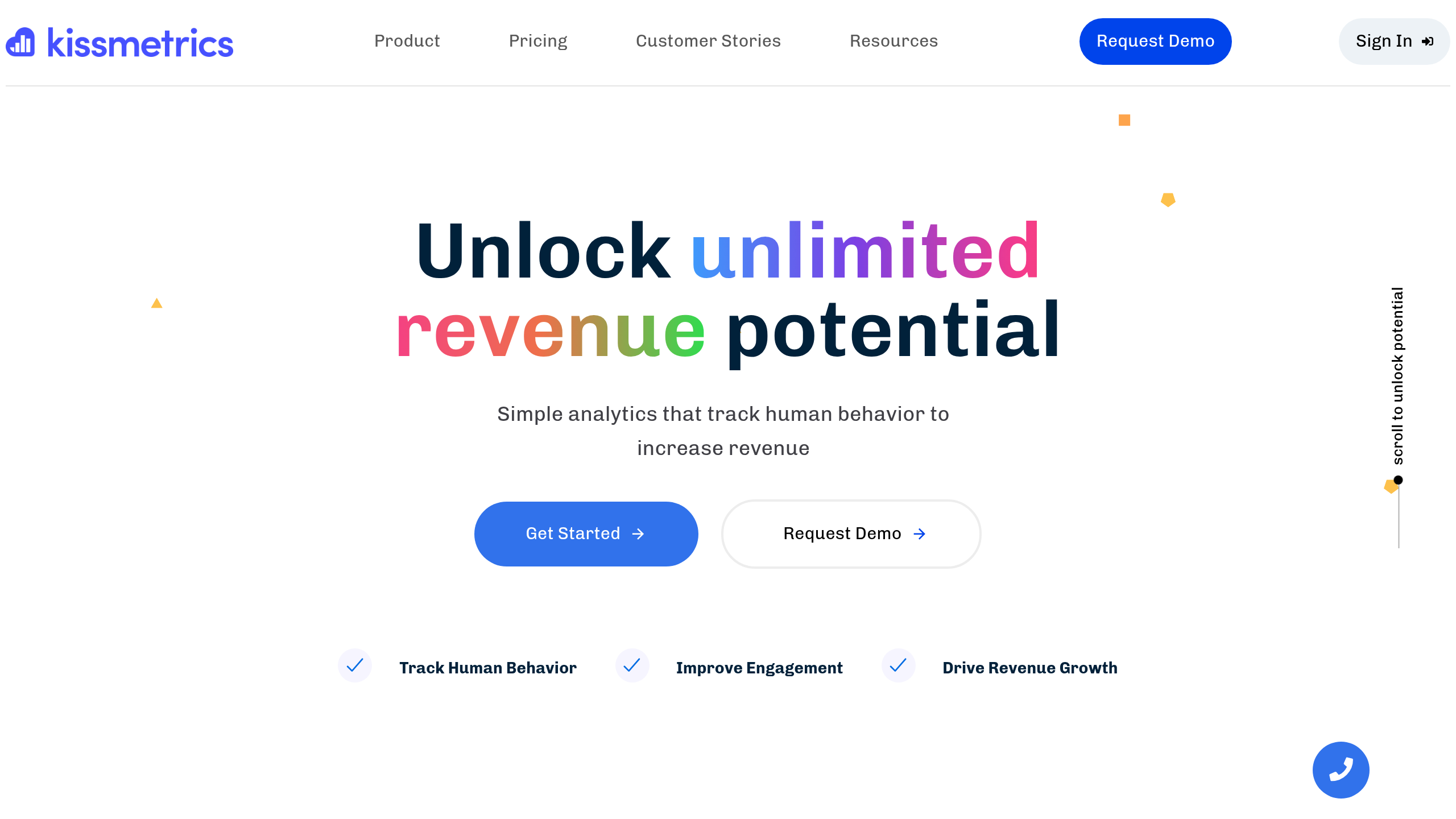
Kissmetrics focuses on tracking customer behavior, allowing businesses to understand how users interact with their products over time. This insight is vital for optimizing marketing strategies and increasing retention.
1. Customer Tracking: Kissmetrics tracks individual user behavior across multiple sessions, providing a comprehensive view of customer journeys.
2. Cohort Analysis: The tool allows marketers to segment users based on specific behaviors and timeframes.
3. Funnel Analysis: Kissmetrics visualizes conversion funnels, helping identify where users drop off.
4. Revenue Tracking: Users can monitor the revenue generated from specific campaigns and channels.
5. A/B Testing: The platform supports A/B testing for optimizing marketing strategies.
A marketing team that utilized Kissmetrics to analyze customer behavior increased retention rates by 25% over six months.
Pros: Focused on customer behavior insights. Cons: Limited integrations compared to larger platforms.
Kissmetrics is ideal for businesses looking to understand their customers deeply. With its focus on behavior tracking, marketers can refine their strategies to enhance customer retention and engagement.
Best for: Social media analytics and management.
Sprout Social provides comprehensive social media management and analytics tools.
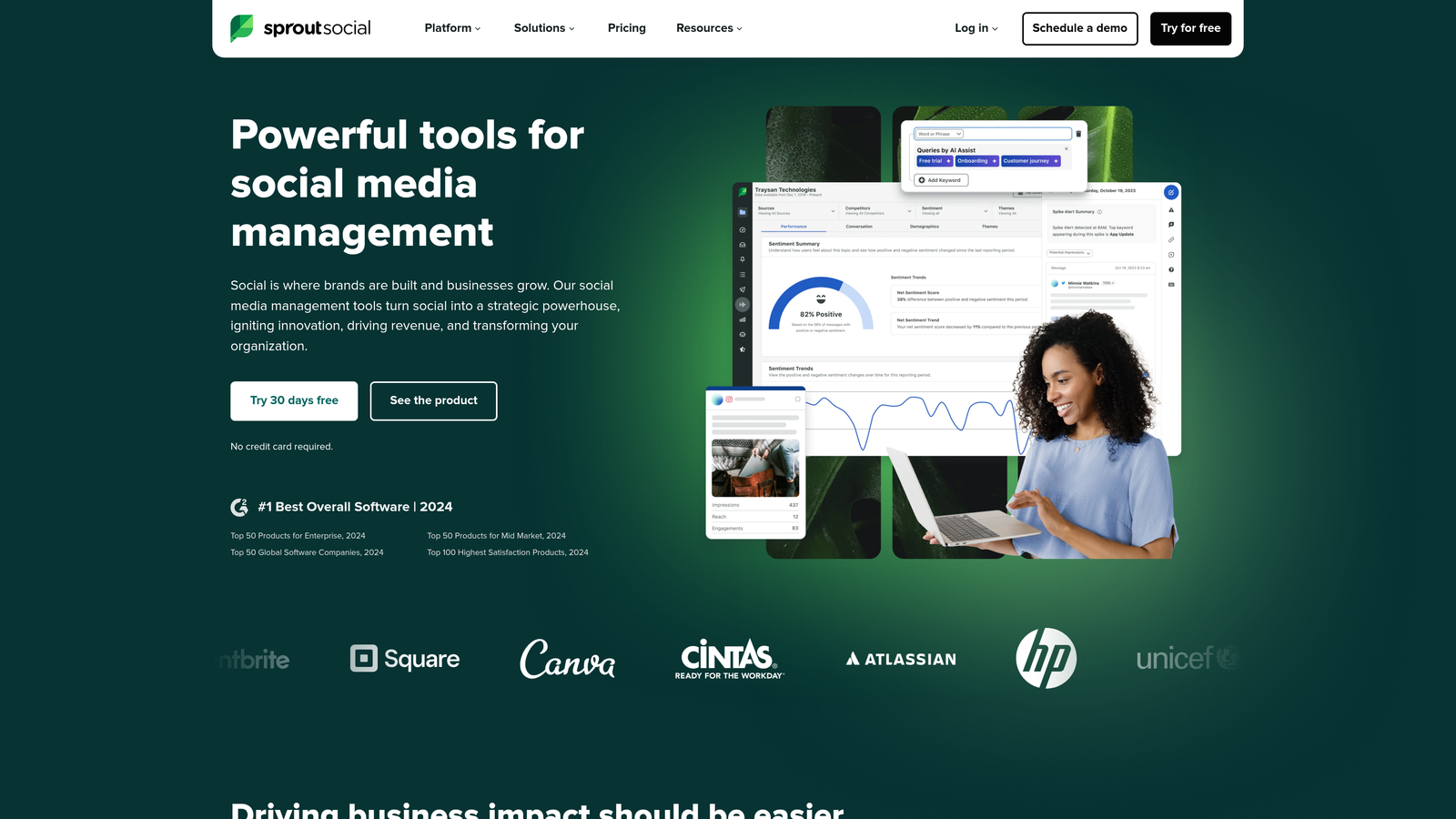
Sprout Social focuses on social media analytics, allowing businesses to track engagement and performance across various social platforms. It provides insights that help marketers optimize their social media strategies.
media presence by 25% within six months, demonstrating the platform's capacity to enhance visibility and engagement. By leveraging Sprout Social's robust social media monitoring capabilities, businesses can stay on top of brand mentions and engagement metrics, allowing them to adapt their strategies in real-time to maximize impact. This feature is particularly beneficial for businesses aiming to maintain a strong brand presence and address customer feedback promptly.
Sprout Social's comprehensive reporting functionality is another crucial benefit, as it provides detailed insights into social media performance. Marketers can utilize these reports to evaluate campaign effectiveness, identify areas for improvement, and make data-driven decisions that enhance overall strategy. The ability to generate reports tailored to specific platforms or campaigns allows for a nuanced understanding of what drives success in different contexts.
The platform's scheduling feature simplifies the process of managing social media posts across multiple platforms, ensuring consistent and timely content delivery. This automation not only saves time but also helps maintain a cohesive brand voice, even when managing diverse social channels. By planning ahead, marketers can ensure that their content aligns with broader marketing objectives and seasonal trends.
In addition to these features, Sprout Social offers audience insights that provide valuable demographic data. This information empowers marketers to tailor their content to specific audience segments, improving engagement and conversion rates. Understanding who the audience is and what resonates with them is key to creating targeted campaigns that speak directly to their interests and needs.
Lastly, Sprout Social's engagement tools facilitate direct interaction with followers, which is essential for building a loyal community. By engaging meaningfully with their audience, brands can foster relationships that result in increased loyalty and advocacy. These tools make it easier to respond to inquiries, participate in conversations, and nurture brand advocates, all of which contribute to a stronger, more engaged online presence.
Selecting the appropriate marketing analysis tool is not merely a matter of preference; it's a strategic decision that can significantly impact a company's ability to harness data-driven insights for success. In an age where data is abundant but actionable insights are scarce, the right tool can transform raw data into meaningful intelligence.
Firstly, marketing analysis tools help businesses identify trends and patterns that are not immediately obvious. By understanding customer behavior and market dynamics, companies can make informed decisions that optimize marketing strategies and improve ROI. For example, a company that effectively utilizes a marketing analysis tool can identify underperforming campaigns and reallocate resources efficiently, leading to better outcomes.
Furthermore, these tools enable precise targeting and segmentation. By analyzing demographic and behavioral data, marketers can tailor their campaigns to specific audience segments, enhancing engagement and conversion rates. A targeted approach not only improves campaign effectiveness but also ensures that marketing budgets are spent wisely.
Additionally, marketing analysis tools provide a comprehensive overview of multi-channel performance, allowing businesses to measure the effectiveness of their efforts across various platforms. This holistic view is essential for understanding how different channels contribute to overall marketing goals, enabling integrated strategies that drive cohesive brand experiences.
Choosing the right tool also facilitates better collaboration within marketing teams. With shared analytics and insights, teams can align their efforts, ensuring that all members are working towards common objectives. This alignment is vital in dynamic environments where rapid adjustments are necessary to stay competitive.
Ultimately, the right marketing analysis tool empowers businesses to move from reactive to proactive strategies, where decisions are based on predictive insights rather than historical data alone. This shift can lead to sustained growth and a stronger market position, underscoring the importance of selecting a tool that aligns with organizational goals and capabilities.
In conclusion, selecting the right marketing analysis tool is a crucial step in transforming your marketing efforts from being merely reactive to becoming predictive and proactive. Among the array of tools available, Cometly stands out as an exemplary choice, particularly for businesses looking to delve deep into real-time analytics and multi-touch attribution. With its robust capabilities, Cometly offers a comprehensive view of the customer journey, allowing marketers to identify key touchpoints that influence buying decisions.
Cometly stands out with its focus on real-time optimization, allowing marketers to adapt their strategies dynamically as market trends and consumer preferences shift. This capability ensures that businesses remain agile and responsive to changes. By employing a sophisticated multi-touch attribution model, Cometly provides a comprehensive view of how various marketing tactics drive conversions. This detailed insight supports more informed decisions regarding budget allocation and strategy enhancement. Utilizing these analytics, companies can fine-tune their targeting efforts and achieve a substantial boost in return on investment. Additionally, integrating marketing dashboard tools into their processes can further streamline data visualization and analysis, empowering marketers to make data-driven decisions more efficiently.
Furthermore, Cometly’s user-friendly interface makes it accessible for marketing teams without extensive technical expertise, promoting seamless integration into existing workflows. The confidence in data accuracy that Cometly provides is another pivotal advantage, as it assures marketers that the insights they rely on are both precise and actionable.
Overall, Cometly not only equips marketing professionals with the tools needed to optimize current campaigns but also aids in predicting future trends, setting the stage for sustained growth and a competitive edge in the market. By choosing Cometly, marketers can ensure they are making informed decisions that drive meaningful results, ultimately transforming their data into actionable strategies that resonate with their target audience.
For marketers eager to harness the full potential of their data, integrating Cometly into your marketing strategy could be the game changer you need. As businesses navigate the complexities of digital marketing, understanding the customer journey from start to finish is essential. Cometly excels in providing real-time insights and a detailed view of multi-touch attribution, allowing marketers to refine their strategies and maximize ROI.
Imagine being able to instantly identify which touchpoints are most effective in driving conversions and optimize your marketing efforts accordingly. With Cometly, you can achieve this and more, thanks to its robust analytics capabilities. By offering a user-friendly interface, Cometly ensures that even teams without extensive technical backgrounds can make the most of its features. This accessibility is crucial for organizations that need to integrate advanced analytics without disrupting existing workflows.
Moreover, Cometly’s commitment to data accuracy means you can trust the insights you gather, making it easier to make informed decisions that align with your business objectives. Whether you are adjusting ad spend or tweaking your messaging for better engagement, Cometly provides the tools you need to stay ahead of the competition.
Ready to transform your marketing data into actionable strategies? Get started with Cometly today and elevate your marketing efforts to the next level. By leveraging its cutting-edge technology, you can ensure that every marketing dollar is spent wisely and every campaign is optimized for success. Don't wait to make the shift from reactive to proactive marketing; embrace the future with Cometly and watch your business grow.
Learn how Cometly can help you pinpoint channels driving revenue.
.svg)
Network with the top performance marketers in the industry